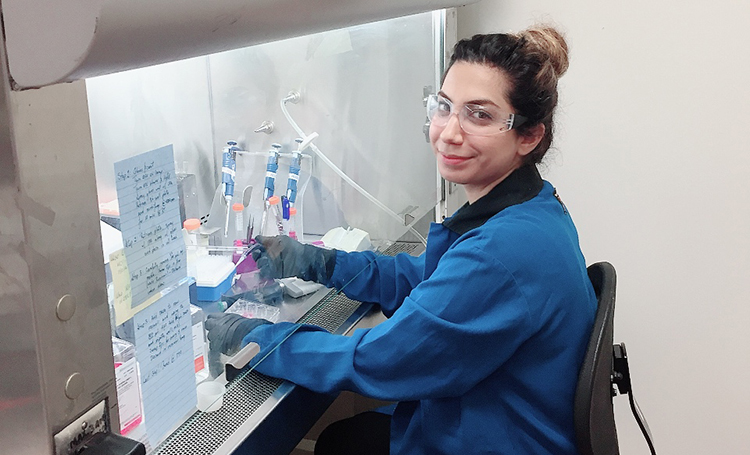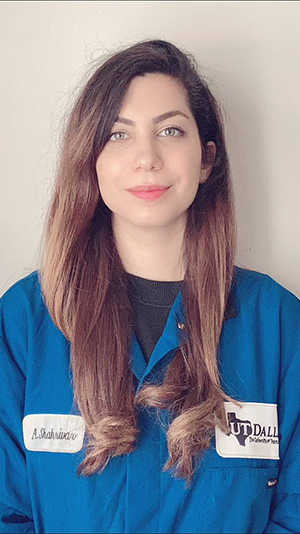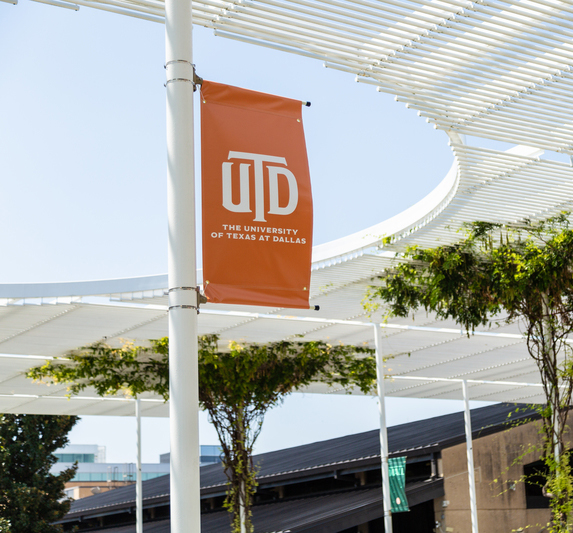
When Arezoo Shahrivarkevishahi PhD’21 was asked what she looks forward to most following the successful defense of her dissertation this year, she responded like a Super Bowl champion: “I’m going to join Pfizer!”
Yes, that Pfizer of Covid-19 vaccine fame, headquartered in New York City.
As an example of UT Dallas attracting the best and brightest, Shahrivarkevishahi said she came to UTD from Iran to work on projects that can have an impact on people’s lives.
“UT Dallas’ great facilities in the chemistry and biochemistry department, and its great faculty, attracted me to UTD,” she said. “I started working in June 2017 as a volunteer researcher.”
It was a notable experience as well for Dr. Jeremiah Gassensmith, associate professor of chemistry and biochemistry at UT Dallas.
“I typically wouldn’t entertain the idea of a ‘volunteer graduate student’ but Arezoo was remarkable and persistent,” Gassensmith said.
“She would read the papers we published and come to me to talk about them, so I arranged for her to be a visitor to the lab. Then, when the opportunity presented itself, she worked very, very hard. I knew we needed to get her into the PhD program, and the next year (2018), she was officially in!”
In November Shahrivarkevishahi presented an oral defense of her research, which focuses on turning biomolecules into favorably engineered materials for several new functions, varying from cancer therapy to cell-delivery systems.
She accomplishes this by introducing the next generation of immunophotothermal agents, called PhotothermalPhage, which are based on conjugating near-infrared dye to the surface of a virus-like particle (VLP).
VLPs are multifunctional nanocarriers that mimic the architecture of viruses. They can serve as a safe platform for specific functionalization and immunization.
“The immunogenicity of VLPs, combined with a high photothermal effect, led to effective suppression of breast cancer tumor cells and significant reduction in lung metastasis, increasing survival time,” Shahrivarkevishahi said, noting that the approach has not yet been tested in humans.

Shahrivarkevishahi received her bachelor’s in chemistry and master’s in analytical chemistry from Shiraz University in Iran. She credits her supervisor there, Dr. Bahram Hemmateenejad, for helping her build a strong foundation in chemistry and analytical chemistry.
Shahrivarkeshahi also shared her perspective as an international student.
“I feel I had to work harder, not just because of the differences in culture and language, but because opportunities don’t come our way as often. In my case, I had to fight every step along the way. And I had to prove myself each time.
“Fortunately, I never gave up, and I never forgot the whole reason I came abroad: To learn. I hope it changes, and the next story can be different,” she said.
Gassensmith praised the dedication of his mentee.
“To her credit, she’s extremely talented and managed to produce some very important and high-impact work for the lab group. She not only learned how to do organic synthesis to make her molecules, but she also learned how to test them in cells and in animals. This required Arezoo to work all the time in the lab. But she was very particular about how her data was collected, and she wanted to learn how to do everything herself.”
Her research was published recently in the Journal of the American Chemical Society.
Shahrivarkevishahi now works for Pfizer on the early clinical development team in Groton, Conn., where she participated in a summer internship from May to August. As part of her PhD preparation, she also interned with GC Therapeutics, a company in Cambridge, Mass., from August to November.
“My plan after graduation is to challenge myself in different areas of research, to learn more and to apply my knowledge in a way that significantly impacts people’s lives by addressing medicine’s greatest challenges.
“I received offers from Pfizer, Moderna, Merck, and two startup companies. Each interview was great,” she said. “Learning more about the field of research I’m interested in specifically from impactful companies absolutely was an amazing experience.”
– Arezoo Shahrivarkevishahi
“During my interviews I met several scientists with years of experience in industry that helped me get a better idea about my future. It helped me build a network of people at different companies. And learning about ongoing projects in my favorite field of research made me more excited and motivated to join industry and use my knowledge and expertise there,” she said.
In her free time, Shahrivarkevishahi said she most enjoys spending time with her husband, watching movies, talking with friends and working out. Her hobbies include fishing and canoeing. Her husband, Dr. Khashayar Rajabimoghadam, studied chemistry at Southern Methodist University and now is doing his postdoctoral work at Yale University.
Shahrivarkevishahi said she hasn’t been able to visit her family in Iran since 2016 because of the travel ban and difficulties gaining proper visa status.
“I miss them so, but I’m lucky having my husband close to me. He helps me make it through the tough days,” she said.

Help us leave the planet a better place for future generations. Your support for the School of Natural Sciences and Mathematics funds scientific discoveries with real-world applications, student and faculty recruitment, and academic scholarships.